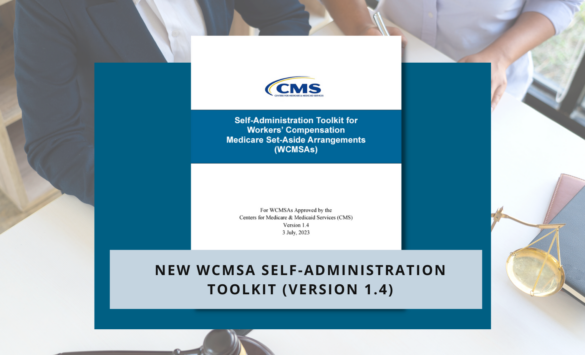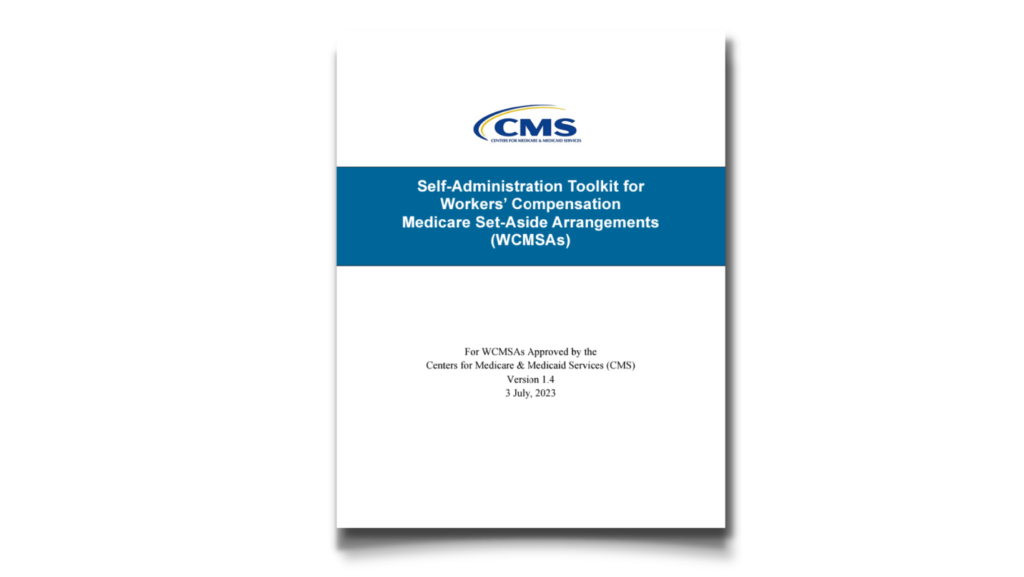On July 3, 2023, the Centers for Medicare and Medicaid Services (CMS) updated the Self-Administration Toolkit for Workers’ Compensation Medicare Set-Aside Arrangements (Toolkit) (to version 1.4). The Toolkit provides guidance around administering a Medicare Set Aside (MSA) and is geared towards individual beneficiaries self-administering their MSA. The Toolkit is the most comprehensive CMS document with respect to post-settlement MSA administration and taken together with pertinent sections of the Workers’ Compensation Medicare Set Aside (WCMSA) Reference Guide, CMS’s WCMSA Self Administration webpage (and related links), and CMS’ WCMSA approval letter – these documents comprise official CMS information relative to MSA administration. There are other CMS documents that speak to billing procedures for MSAs and are directed more towards the provider community. These include the Internet Only Manual (IOM) Publication (Pub.) 100-05 Medicare Secondary Payer (MSP) Manual, Chapter 3, MLN Matters Article (SE17019), and Medicare Claims Processing Manual, Chapter 27 - Contractor Instructions for CWF.
The 32-page Toolkit breaks down MSA administration in pertinent sections (14 in all) and covers, among other things, account set-up requirements, utilization of the account, reviewing and paying bills, record keeping, attestation reporting, situations around exhaustion / depletion and sample letters.
What changed in version 1.4?
A side-by-side comparison shows minimal changes from version 1.3 to 1.4. There are no notable substantive changes, additions, or revisions.
Section 1 (on pg. 3) added a definition of “appropriately exhausted”. “‘Appropriately’ means you spent this money on what it is supposed to be used on, and ‘exhausted’ means the money has all been spent.”
A minor change was made to Section 11 to clarify instances where there aren’t sufficient funds to cover applicable services. It reads, in pertinent part: “[i]f you only have WCMSA funds to pay for part of a bill…” (v 1.4) vs. “[i]n the event that you have WCMSA funds to pay part of a bill…” (v 1.3). Section 11 deals with depletion/exhaustion of the MSA. And while no substantive changes occurred in this section, save for the minor clarification as noted – it is worth pointing out that the MSP Manual, Chapter 3, Section 30.2.2.1, titled, “Responsibility of Provider Where Benefits May be Payable Under a Workers’ Compensation Medicare Set-Aside Agreement (WCMSA), which was recently amended and effective as of March 24, 2023, indicates that:
If the WCMSA does not pay for all the services due to total exhaustion, the provider may submit a Medicare bill indicating what the WCMSA paid. Medicare may then pay as a primary or secondary payer, dependent upon the WCMSA status.
Further information on these procedures can be found in the Ametros article here.
Additional minor revisions were made to outdated naming conventions, i.e., BCRC vs. MSPRC; Medicare.gov vs. MyMedicare.gov, etc.
Importance of MSA Administration
Revisiting the Toolkit highlights complexities of MSA administration and the importance of properly managing and administering MSA funds. For good reason, CMS “highly recommended that settlement recipients consider the use of a professional administrator for their funds.” See WCMSA Reference Guide, v3.9, Sec. 17.1.
Utilization of a professional administrator removes the risk that an individual will be unable to adhere to CMS’ requirements and put their future Medicare benefits in jeopardy. In addition to compliance, a self-administering individual will also not have the benefit of cost savings and support.
If professional administration isn’t offered or known to the settling parties, it’s often left to the injured individual’s attorney to educate them on the complexities of MSA administration. The Consent to Release (CTR) authorization that an injured individual executes when an MSA is submitted to CMS for review requires validation that they “understand the WCMSA intent, submission process, and associated administration.” See WCMSA Reference Guide, v3.9, Sec. 10.2.
CMS also provides a sample attorney letter in Appendix 6: 30 of the Reference Guide, to validate that the injured individual has been counseled on the MSA administration requirements. The substance of the sample letter reads:
I, Legal Eagle, counsel for Jane Doe, have reviewed the above agreement with the Claimant and have explained it in detail. I believe that Ms. Doe fully understands the complete contents of the document and the duties she is undertaking to administer her WCMSA.
In many cases it’s left to the injured individual’s attorney to educate their client on MSA administration and there is, therefore, potential risk for the attorney in the event there are missteps in the administration process.
These risks can be eliminated – and many benefits can be gained by all parties to a settlement – by the use of a professional administrator like Ametros.
While there weren’t significant changes, as the nation’s largest and leading professional administrator of MSAs, we’ll continue to monitor all guidance from CMS relative to MSAs and MSA administration. For any questions, you can contact us at 978-488-5707, reference our FAQ library, or email us at marketing@ametros.com.



